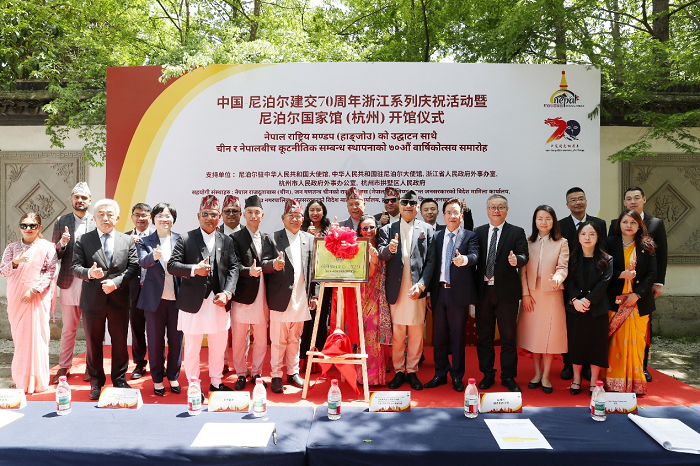Welcoming the world
A recent salon examines how China's visa relaxations and parallel developments are coaxing a surge of inbound visitors, Erik Nilsson reports.
Noel Su Nuoyi, a Spanish social media influencer with over 3 million followers on short-video platforms like Douyin, says an unexpected encounter with an android charmed his mother when she visited China following its recent visa relaxations for inbound visitors.
"We were in a hotel in Shanghai, and we ordered something, and then it came. A really cute robot brought the food, and my mom opened the door, and she was (in shock). She was like: 'How do I do this? What's this? What's going on?'
"I showed her how to take out the screen, and she took out the meal. Then, the robot left, and my mom closed the door. She came back to me and was like: 'Can we order something more? I want the robot back.'"
She snapped a photo with the android the next day.
"I think that's also a cultural difference because we're living here, and we're used to that. We see robots, we see technology everywhere. But for my mom, she came from Spain, she was shocked to see how technology is in our daily life here," he says.
Su Nuoyi joined a recent Embracing Cultures salon hosted by China Daily that examined how travel to China has become more accessible to international visitors as the country has appreciably relaxed visa policies. That is, while also undertaking corresponding measures to make travel easier after arrival.
These led to a sixfold increase in arrivals last year compared with 2023, China Odyssey Tours president Zhou Xiaoguang says.
Source countries fueling this growth include Southeast Asian nations like Singapore and Malaysia; as well as European countries, including Italy and Spain. Zhou expects more visitors from France, Germany, Australia and New Zealand this year.
Ease of entry
Zhou says industry insiders often deliberated inbound tourism's main "pain points".
"We came to the conclusion that probably one of the biggest difficulties was the visa because, years ago, foreigners coming to China had to spend a lot of time filling in all the forms. It took a long time for them to apply and finally get the visa from the embassy or consulate," he recalls.
"So, we kept having a wish in our hearts that if sometime in the future our customers can travel to China just by buying air tickets with their passports, they can come to China as they like. This was a kind of a dream. But finally, it came true."
Su Nuoyi says the policy has inspired many of his friends and family from Spain to book flights to China.
"They just text me, and they're like, 'I'm going to Beijing, and I just want you to show me around'," he says.
"People have always been interested in this country. It was just harder to get here, and now it's easier. I think I feel like there's no barrier anymore. So, for them, it's very comfortable just to hop on a plane to come to China just to look around."
Farther flung
Ecuadorian-Italian Andres Rodriguez, market development director at Dragon Trail International, advises first-time visitors: "You should plan, and you should also let it go: Go with the flow."
The policy changes are prompting international travelers to change their plans and where they go in China.
The Great Wall is great, the Grand Canal is grand; and armies of tourists march to see the Terracotta Warriors every year. But the influx of inbound visitors means more of them are discovering lesser-known corners of the country.
"There was a very interesting change compared with years before. International tourists coming to China would like to cover the iconic cities like Beijing, Xi'an (in Shaanxi province) and Shanghai very much, and very few of them would go to more places in China," Zhou recalls.
"But now, after the restart of this inbound business (after COVID pandemic), we could see that lots of our clients spend their time to go to places where there were not that many international tourists before, for example, Gansu province or Nanjing in Jiangsu province or Hangzhou in Zhejiang province, and even places like Shantou in Guangdong province and Yangzhou in Jiangsu."
They are often repeat visitors, he explains.
"A lot of people during their first visit tend to do the classics. Then, when they come back, they tend to do something a bit more unique," Zhou says.
Salon participants agreed that social media is another driver pushing globetrotters farther off the beaten path.
"China is not a one-time experience," Su Nuoyi says.
"I think that's like the kind of beauty, that because you've been there once and you've seen the mainstream cities, then you keep checking stuff through the magic of social media. And then you want to go back because there are a lot more things to experience in China. There's this kind of thing to explore the unexplored."
Social skills
But social media is doing more than introducing new destinations. It's also shaping international audiences' understandings of everything from government policies to ordinary people.
Rodriguez says more needs to be done to publicize measures beyond visa relaxations that are making it easier for inbound visitors. Many hopeful visitors are concerned about their ability to use Chinese mobile payment platforms and don't know new measures have improved their capabilities to link these to international credit cards.
"That needs to be extensively communicated. You have to convey the message: It's not as hard as you think. I understand it was harder before, but things are evolving. Things are changing," Rodriguez says.
And promotions should go beyond just destinations to include festivals, cuisine, and increasingly, events, he says. He explains that his Italian friend learned about and visited Yunnan province because it hosted a major cycling event.
Also, new media should use "creativity in storytelling" to introduce China travel.
Su Nuoyi says: "I've realized that when I publish any video related to Chinese people is when they get more engagement on international social media platforms. Most of the people who come to China cannot speak Chinese, and we don't expect anybody here to speak English to us. So, it's like, you're here, but sometimes you cannot get close enough to get to know them."
That's where social media can bridge gaps, he says.
"Sometimes, (international audiences) can rely on me and my conversations with Chinese people to get to know people better," Su Nuoyi says.
Zhou says many travelers have reported their in-person interactions with locals as highlights of their trips.
"For foreigners coming to China, the best scenery is the people," Zhou says.
"Coming to China, they can enjoy not only the beautiful view, the rich culture, the old history and everything, but also meet Chinese people in different places. That will be a very different experience."
Measuring up
Authorities' efforts to improve access for inbound travelers is extending beyond visa relaxations and mobile payments. More hotels are buying readers for international credit cards, and more destinations are posting English-language signage, Zhou says.
New measures enable foreigners to use passports onsite to get tickets for some top destinations like the Forbidden City in Beijing and Terracotta Warriors in Xi'an, Shaanxi, which are otherwise hard to obtain, even for Chinese citizens, Zhou says.
"Foreigners can just walk there and buy it themselves. There are no restrictions at all."
He points out many major attractions still don't have such services.
"But more scenic spots are trying to apply these policies. This is a great improvement," Zhou adds.
The government is investing more in foreign-language training for guides, especially in less-visited regions. And it's working to meet the growing demand for languages other than English.
"We are very short of Spanish and Italian-speaking tour guides all over China," Zhou says.
Gesturing toward Su Nuoyi and Rodriguez, he says: "If you choose to work as tour guides in these places, I can assure that you will have a very healthy income."
Tech touch
But technologies like AI are fulfilling many functions, such as translation and travel planning.
"If I need a simultaneous translation, I go to my (AI) app," Rodriguez says.
"If I'm visiting a cultural historical spot and I want to have insights about this site — let's say, I'm visiting the Forbidden City — if I want to have some historical background on it, I can go to DeepSeek to search about it."
Some trip-planning AI platforms offer real-time info on flights, transportation, attractions and the like, he explains.
Su Nuoyi says: "My mom and my brother came here, and they were shocked by how technology is part of daily life in China. I think that's also part of the culture."
Zhou believes technology can only enrich what ultimately remain human experiences.
"You can use an app to make an easy translation. You can get an itinerary from the app very easily. But still, you need to talk with the people and know what they're really thinking," he says.
"This exchange is more important. This is something that'll never be replaced by any technology."
-
Inside Hangzhou: China's high-tech dream factory
March 12, 2025



